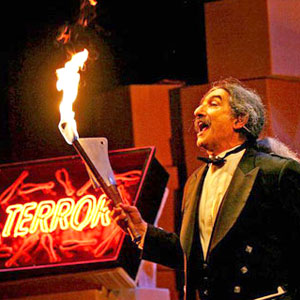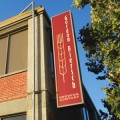Known for their theatrical comedy, outlandish outfits and juggling antics, the Flying Karamazov Brothers return to San Jose Rep Theatre for their performance, “40 Years of Wondering, Juggling and Cheap Tricks,” a retrospective of their career. Paul Magid co-founded the quartet in 1973 is the remaining original Karamazov Brother in the current lineup. In addition to creating and writing shows for the Flying Karamazov Brothers, Magid also writes plays, including “The Three Moscowteers” and “Room Service.”
We spoke with him in an interview before the first Flaying Karamazov Show in San Jose, running February 15 to February 24.
You are in San Jose for the world premier of your 40th anniversary show. What can the audience expect?
They’re going to see lots of things we haven’t done for many, many years. When we first started out, we were working on the streets and juggling torches—none of which we’ve done in more than three decades. There’s a rhythm juggling we haven’t done in 30 years. There are a couple of big audience participation pieces. We have a couple of signature pieces, like our version of improvised juggling and “The Gamble,” where we have to juggle different items brought in by audience members. The show is about the story of our passage from 1973 and all the things we’ve done and all the various Karamazov Brothers. It’s very unlike what most people do. Most people classify us as jugglers, but we do a full range of theater with a twisted sense of humor. That’s been our signature way for many of years.
You started 40 years ago on the streets of Santa Cruz. Tell me about the scene back then and what led you to out into the streets in the first place.
We were going to UC Santa Cruz and we started there. Back then, it was a lot less controlled. No one had ever been on the streets performing. The cops didn’t know what to do; it was fantastic. We got huge crowds and stopped traffic in the streets. It was very alive. We were very young, too—in our teens. It was just a very full and exciting existence. We were making money instead of having to get real jobs. It was also a very creative time, too. Back then in the early 70s, there was a lot of energy and magic in the air, which there is a little less of these days.
Where can we expect to find you hanging out between performances during your stay now?
Probably here in the San Jose Rep Theatre, working all the time. What we do is so difficult; it actually takes a lot of work and rehearsal, especially the juggling. It happens in less than a split second, so it takes a lot of thought. We do a lot of ensemble juggling. Everyone has to be in agreement with each other. If there’s a little mistake, it all blows up. We practice 10 hours a day.
You’ve made a lot of friends along the way. How did you end up hooking up with the Grateful Dead back in the 80s?
We became really good friends with Ken Kesey, the author of “One Flew Over the Cuckoo’s Nest” and he was a friend of the band. We stayed at his house and became friends not only with the Grateful Dead but also with different poets and authors of previous generations. We became the opening act for the Grateful Dead. That was really exciting. It’s always a surprise—you never know what’s going to happen. We played in Germany and London with them.
What are some other interesting highlights that stand out?
There’s so many. We made the movie “Jewel of the Nile,” where we went to Morocco and shot the movie with Danny DeVito. It was exciting to be in a big movie set and in a foreign country, riding in the dessert. We opened for Frank Sinatra on Broadway and starred in lots of TV shows like “Seinfeld.” We used to hang out with Dolly Parton back in the day. When we first met her, she said, “I bet you boys can’t juggle these!” I think you know what I’m talking about.
How are your acts different now than 40 years ago?
Our shows have been evolving over the years. Every couple of years, we put on a show. We have done 20 shows so far, and this will be the 21st show. We talk about our lives, travels and some of the adventures we have on the road and the different people we meet. The show is chronologically done so it shows an evolution of what we’re doing. We’ve been working with a British director, Alan Cohen, who does a lot of West End work. He’s been instrumental to our acts. There will be a circular screen that showcases a lot of photos and videos of us in the past.
Where do you get inspiration for new material?
We’re inspired by life experiences, adventures and all the people that have been involved in the show for many, many years. There’s a mix of old and young in the show. There are four of us total.
How do you decide what you are going to juggle?
We are inspired a lot by things that happen to us, so we often do a bit off of that. We’re also inspired by works of the past—literature and plays. We come up with material based off that and we come up with things that we think are funny. We’ve been working on the idea of juggling with music. As for objects, sometimes it’s the usual things, like clubs and balls. Sometimes we juggle with ‘danger’ objects, such as torches, sickles, knives and machetes. We also juggle while playing the marimba at the same time. We actually do a street show outside before the show starts so the audience is going to get a great sense of what we’ve done.
What are some of the crazy things you’ve had to juggle?
We’ve had to juggle broccoli, lots of things covered in oil and lots of fish. We had very strange items, like octopus and Slinkys. Anything anyone can think of, we’ve had it. We encourage people to bring items, but it must be heavier than an ounce, lighter than 10 pounds and no bigger than a breadbox. Oh, and nothing alive, either.
How many times has something landed on your head?
Every day. Juggling hurts. It happens all the time.
What’s the most important thing for aspiring jugglers to know?
Basically, you have to practice and remain calm. It’s when you get nervous that juggling goes haywire. You have to remain calm and look at everything as a whole. If you’re thinking about something individually, it’s going to happen too fast for you to think that fast. You can’t think that fast—the mind process turn out is incredibly slow. You need to maintain a certain Zen attitude. Juggling is a great exercise in being able to “be there,” to actually be present.
How should the audience prepare for your run of San Jose shows?
They should be prepared for anything. This is not going to be your regular show. There is no fourth wall—the audience is a performer in the show. They’re going to be heavily involved so they need to prepare themselves to be a willing participant and it’ll be loads of fun. We encourage people to bring interesting items for the Champ to juggle, but no sharp objects.
Showtimes
Feb. 15 – 8pm
Feb. 16 – 3pm, 8pm
Feb. 17 – 2pm
Feb. 20 – 7:30pm
Feb. 21 – 8pm
Feb. 22 – 8pm
Feb. 23 – 3pm, 8pm
Feb. 24 – 2pm
San Jose Repertory Theatre
101 Paseo de San Antonio
San Jose, CA 95113

 55 South Adds to Cocktail Culture in San Jose
55 South Adds to Cocktail Culture in San Jose  Tacolicious Opens in Palo Alto
Tacolicious Opens in Palo Alto 


